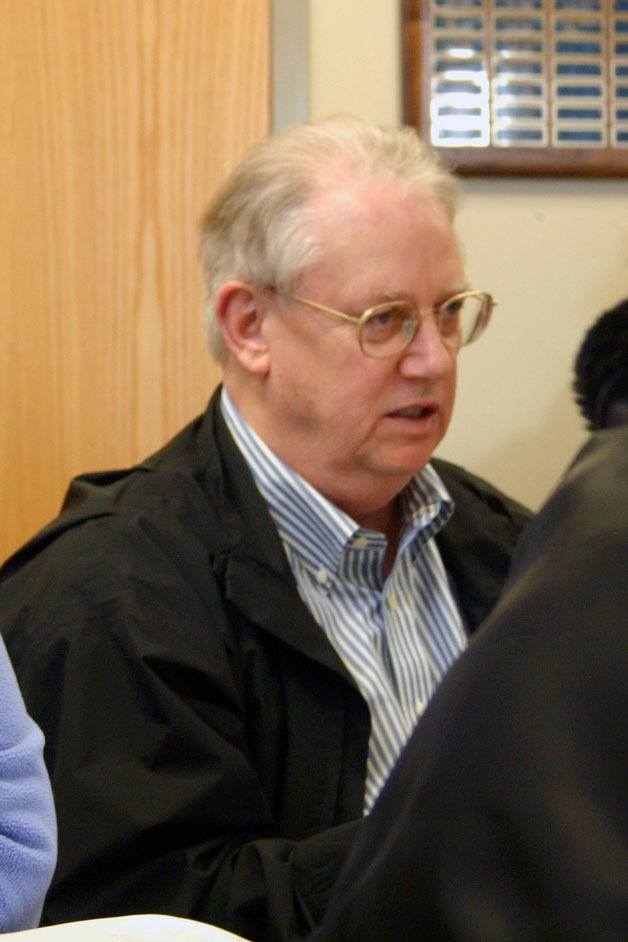FREELAND – Costs for recruitment, retention and fire suppression drew questions from several members of the public during a recent South Whidbey Fire/EMS commissioners meeting.
Of the 14 people in attendance at the Freeland station, only three spoke out against the costs of a potential 15-cent levy increase for South Whidbey’s fire district. Fire commissioners Kenon Simmons, Mike Helland and Bob Elliot and Fire Chief Rusty Palmer responded to the public’s comments, concerns and criticisms of the property tax increase that would help the fire protection district’s operations budget for the next few years.
Concern wasn’t confined to the public. “I don’t want to pay a penny more in taxes than I have to,” Commissioner Simmons said. “I just personally need it justified.”
The fire chairman had some company in that opinion. A few of the public commenters questioned the necessity of increased fire suppression funding when the district responds primarily to emergency medical calls.
“We’re going to have to suspend investment in stations and equipment we probably can’t afford, and we’re going to have to move in a direction where your primary service is medical,” said Bob Walters, a Langley resident.
“It’s this very difficult problem where you walk away from all that capital and investment.”
Chief Palmer acknowledged the response ratio is higher with medical calls than fires. Recent U.S. Census figures show South Whidbey is aging, which in Walters’ eyes means medical response will be critical in the future.
In order to provide sufficient fire protection, however, Palmer and the commissioners are bound by rules and regulations and also consider how any reduction in fire engines and staff may impact insurance rates on South Whidbey. Simmons and Palmer said the low population density of many areas on South Whidbey makes the idea of relocating the fire stations a difficult proposition.
“Where am I going to find 18 firefighters who are going to want to live within three miles of that station?” Simmons asked.
One of the commissioners’ consistent defenses against criticism of the funds associated with recruiting, training and keeping volunteer firefighters is the potential cost of a paid firefighting staff. One audience member who also volunteers with the fire district and is a former fire commissioner, Gary Gabelein, defended the cost of emergency medical services in the fire district when the commissioners were asked about their working relationship with Whidbey General Hospital, which responds to medical calls and transports patients north to Coupeville and across the ferry to Everett.
“Our volunteers are saving the taxpayers a ton of money,” Simmons said.
Gabelein added: “We are saving taxpayer money by supporting and providing ambulance service.” Fire district EMS crews are usually first on the scene of a medical call, but transport is made by Whidbey General ambulance.
Don Carscadden, a former volunteer with the fire district, had qualms about the cost of recruiting and retaining volunteers. He said South Whidbey Fire/EMS spent about $400,000 in the last year to recruit and keep fire protection and emergency medical technician personnel, and “that seemed like an awfully high number.” Palmer said the island’s job market and volunteer firefighting policies train young firefighters and EMTs who seek paid positions elsewhere.
“We have a tough time keeping recruits here,” Palmer said. “We inspire them away.”
“Are we wise to recruit 20-year-olds thinking they’re going to stay here 20 or 40 years? It’s not like that anymore.”
The proposed 15-cent levy increase would put the total to 76 cents per $1,000 of assessed property value. It was a figure that some in the audience said was unrealistic. A $200,000 property would pay $152 annually in fire protection taxes.
“As a taxpayer, I’m sitting there trying to get the most bang for my buck and trying to address all those costs,” Carscadden said. “Most of us who are retired now live on a fixed income and need to live within our means.”
The fire commissioners will have more meetings to hear public input regarding the fire levy increase before they vote on whether to put it on a ballot. It was proposed that the commissioners should seek the increase in November. The next meeting will be Thursday, May 10 at the Freeland Station, 5535 Cameron Road, Freeland.



